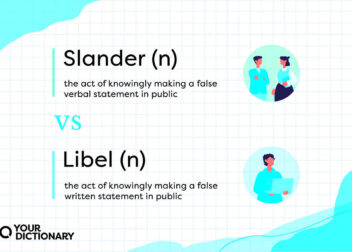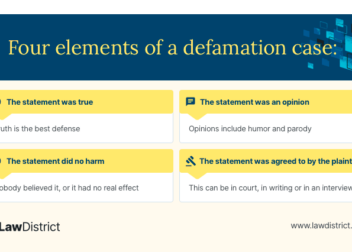Understanding Colorado Defamation Laws
In Colorado defamation involves making untrue statements about a person that damage their reputation. Picture this scenario you’re at a gathering and someone starts a groundless rumor about you. If that rumor tarnishes your reputation it could be seen as defamation. In Colorado defamation can manifest as slander (defamation) or libel (defamation).
In order for a statement to be considered defamatory it needs to be both untrue and harmful. Statements that are true, even if they are not pleasant, do not qualify as defamation. For example if someone honestly critiques your cooking abilities that wouldn’t be seen as defamation, even if it’s not very nice. The crucial factors here are the inaccuracy of the statement and the harm it inflicts.
Types of Defamation: Slander and Libel
In Colorado defamation is classified into two types slander and libel. While both involve damaging a persons reputation they differ in how the harm is conveyed.
- Slander: This involves spoken false statements. Picture a colleague gossiping at the office about a personal issue you’re dealing with. If these statements are untrue and harm your reputation, it could be slander.
- Libel: This refers to written or published defamatory statements. Think of a blog post or social media comment spreading false information about someone. If these writings damage someone’s reputation, they may be liable for libel.
In situations the injured party needs to demonstrate that the statement was not true and had a negative impact. The purpose of defamation laws is to safeguard people against unjust damage to their reputation caused by either spoken or written communication.
Elements Required to Prove Defamation
In order to win a defamation lawsuit in Colorado there are a few essential factors that need to be shown. Each of these factors is important in demonstrating that defamation has taken place.
- False Statement: The statement made must be false. Truth is a defense against defamation claims. For example, if someone falsely accuses you of theft when you’ve never stolen anything, that’s a false statement.
- Publication: The false statement must be communicated to at least one person other than the person it’s about. If someone says something false about you only to you, it doesn’t count as defamation.
- Harm to Reputation: The statement must harm the person’s reputation. This harm can be in the form of lost job opportunities, social isolation, or emotional distress.
- Fault: In some cases, especially involving public figures, it must be shown that the statement was made with actual malice or negligence. This means that the person making the statement knew it was false or acted with reckless disregard for the truth.
Grasping these aspects can assist you in maneuvering through the intricacies of a defamation lawsuit, making sure you tackle every element comprehensively, if you ever find yourself facing such a scenario.
Defenses Against Defamation Claims
Defamation cases can be intricate and there are various arguments you could present if someone accuses you of defamation. Picture a situation where someone takes issue with something you said but you have a solid justification. Being aware of these justifications can significantly impact the outcome of disputes.
- Truth: The most robust defense against defamation is proving that the statement made is true. For instance, if you share a factual account of someone’s actions that might be unpleasant but accurate, it’s not defamation. Truth always trumps falsehood in these cases.
- Opinion: Statements that are clearly opinions rather than factual claims are generally not considered defamatory. If you say, “I think that restaurant has the worst service,” that’s an opinion, not a defamatory statement.
- Privilege: Certain statements are protected by privilege, meaning they are immune from defamation claims. This includes statements made during judicial proceedings or legislative debates. For example, if someone makes a statement in a court case or a legislative session, they are usually protected.
- Consent: If the person who claims defamation gave consent for the statement to be made, then they cannot claim defamation. This might occur in situations where individuals give permission for their information to be shared publicly.
Grasping these protective measures can assist you in safeguarding yourself in the event of a defamation lawsuit by equipping you with the knowledge to respond to the allegations in a way.
Public Figures and Defamation Standards
Public figures face a standard when it comes to defamation lawsuits than regular folks. If you’ve ever kept up with a sensational court case or read about a famous person’s courtroom dramas you’ve witnessed this firsthand.
Famous people like politicians and celebrities need to show that a damaging comment was made with actual ill intent to win a defamation case. In other words they have to prove that the statement was made knowing it was untrue or being careless about the truth. This requirement is stricter compared to what regular folks have to deal with.
- Actual Malice: To meet this standard, public figures must prove that the person making the statement knew it was false or acted with a severe lack of concern for its truthfulness. This can be challenging because it requires evidence of intent or negligence.
- Public Concern: Statements about public figures often involve matters of public concern, and courts provide more leeway for criticism in these cases. If someone comments on a politician’s policy decisions, that’s more likely to be protected speech than if it were about a private person’s personal life.
The aim of these elevated standards is to strike a balance between upholding freedom of expression and safeguarding the reputations of individuals particularly those who are in the spotlight.
Statute of Limitations for Defamation Claims
Every legal dispute comes with a deadline for filing a claim called the statute of limitations. If you’ve ever let a claim deadline slip by you know just how important this timeframe is.
In Colorado the time limit to file a defamation claim is usually one year starting from when the defamatory statement was made or when you found out about it. This means you have a window to take your case to court. If you delay too much you could forfeit your opportunity to take legal action.
- Discovery Rule: For defamation, the clock starts ticking when the defamation is discovered. If someone publishes a harmful statement online, for example, the one-year period begins when you learn about it.
- Importance of Prompt Action: Due to the short timeframe, it’s essential to act quickly if you believe you’ve been defamed. Gather evidence, consult with legal experts, and start your claim within the stipulated time frame to avoid losing your chance for redress.
Grasping and following the time limits set by law can determine the outcome of a defamation lawsuit. Therefore its essential to remain alert and take action.
Steps to Take if You’re Defamed
Discovering that someone has tarnished your reputation can be an unsettling moment much like a surprise downpour ruining a serene day. If you find yourself facing this challenge understanding the actions to take can assist you in regaining your balance and pursuing fairness.
- Document the Defamation: Start by gathering evidence of the defamatory statement. This includes saving screenshots of online posts, recording what was said, and noting the date and time. Think of it as collecting pieces of a puzzle that will help build your case.
- Identify the Source: Determine who made the defamatory statement and to whom it was communicated. Knowing the source helps in addressing the issue directly and can be crucial for legal proceedings.
- Consult a Lawyer: Speaking with a legal professional experienced in defamation cases is crucial. They can provide guidance tailored to your situation and help you understand your options. A good lawyer is like a trusted guide through a complex maze.
- Consider a Formal Complaint: Depending on the situation, you might need to file a formal complaint or cease-and-desist letter. This step is about formally addressing the harm and requesting the defamatory content be removed.
- Evaluate the Impact: Reflect on how the defamation has affected you personally and professionally. This understanding will help in assessing the damages and the overall impact on your life.
By following these actions you can effectively tackle the issue of defamation and work towards finding a resolution and healing.
Potential Remedies and Damages in Defamation Cases
When seeking a defamation lawsuit it’s important to grasp the potential remedies and damages involved. Its akin to being aware of the possible results before setting off on an adventure.
- Compensatory Damages: These are designed to compensate you for actual harm suffered due to defamation. It might include lost wages, emotional distress, and damage to your reputation. If someone’s false statements have cost you your job or caused severe anxiety, compensatory damages aim to make up for that.
- Punitive Damages: These are awarded in addition to compensatory damages and are meant to punish the defendant for particularly egregious behavior. If the defamation was especially harmful or done with malicious intent, punitive damages might be awarded to discourage such behavior in the future.
- Injunctive Relief: This involves a court order requiring the defendant to stop making defamatory statements and possibly to retract or correct the false information. It’s like getting a court-mandated ceasefire in a conflict.
- Retract and Apologize: In some cases, the court may order the defendant to publicly retract their statements and issue an apology. This can help repair some of the damage done to your reputation.
Grasping these solutions can assist you in maneuvering through the system and pursuing suitable compensation for the damage inflicted upon you.
Frequently Asked Questions about Colorado Defamation Laws
Defamation laws can be complex and it’s normal to wonder how they work. Here are a few frequently asked questions to shed light on the legal nuances.
- What is the difference between slander and libel? Slander refers to spoken defamatory statements, while libel pertains to written or published statements. Both can harm a person’s reputation, but the medium through which they are communicated differs.
- How long do I have to file a defamation claim? In Colorado, the statute of limitations for defamation claims is one year from the date the defamatory statement was made or discovered. It’s important to act within this timeframe to pursue legal action.
- Can I sue for defamation if the statement was made anonymously? Yes, you can still pursue a defamation claim even if the statement was made anonymously. However, identifying the anonymous party can be challenging and may require legal assistance.
- What if the defamatory statement is true? Truth is a complete defense against defamation claims. If the statement made about you is true, it does not qualify as defamation, regardless of its harmful impact.
- Can public figures sue for defamation? Yes, but public figures must prove that the defamatory statement was made with actual malice, meaning it was made with knowledge of its falsity or with reckless disregard for the truth.
The purpose of this FAQ section is to tackle questions and help you navigate the intricacies of defamation laws in Colorado. For inquiries seeking guidance reaching out to a legal professional can offer personalized insights.
Conclusion
In Colorado defamation laws offer a way to address and remedy the damage done by false statements. Whether you’re facing slander or libel knowing the details of these laws can help you take the right steps. If you find yourself in a situation remember to keep a record of everything and seek advice from a professional to navigate your choices effectively. The process may appear overwhelming but with the knowledge and assistance you can pursue justice and safeguard your reputation. Similar to my own encounters with challenges being well informed and proactive is crucial for resolving these matters and progressing, with assurance.


